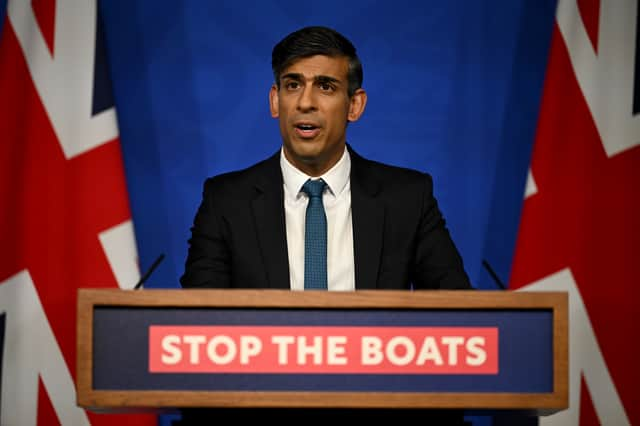Rishi Sunak says he will block legal challenges to Rwanda plan and threatens to quit human rights conventions
and live on Freeview channel 276
Rishi Sunak has said he will bring in emergency legislation to block legal challenges to his Rwanda plan, just hours after the Supreme Court ruled it unlawful.
Earlier today, the highest court in the UK ruled that the government's policy to send asylum seekers to the east African country for processing and resettlement was illegal. It said that there was a "substantive risk" of refoulement - which is asylum seekers being returned to their home countries where they've been persecuted.
Advertisement
Hide AdAdvertisement
Hide AdIt added that there is “evidence of a culture within Rwanda of, at best, inadequate understanding of Rwanda’s obligations under the Refugee Convention”.
In a speech this evening (15 November), Sunak said that he respected the Supreme Court's decision and that the "rule of law is fundamental to our democracy". He confirmed the UK was working on a new international treaty with Rwanda which he said "will provide a guarantee in law that those who are relocated from the UK to Rwanda will be protected against removal".


Sunak then said that if Parliament confirmed the new treaty is safe, he will bring in emergency legislation which would "ensure that people cannot further delay flights by bringing further systemic challenges in our domestic courts and stop our policy being repeatedly blocked".
Despite his comments on the rule of law, the implication from Sunak is that he will try and overrule or block legal challenges in the UK. He also confirmed he would consider quitting the European Convention on Human Rights (ECHR) if that deemed the policy unlawful.
Advertisement
Hide AdAdvertisement
Hide AdThe ECHR was set up through the Council of Europe after the Second World War to prevent atrocities and illegal activity from states like Nazi Germany. It underpins the Good Friday Agreement in Northern Ireland. Experts have said that the UK would be a "pariah" if it left, like Russia and Belarus.
Sunak said: "Even once Parliament has changed the law here at home, we could still face challenges from the European Court of Human Right in Strasbourg.
"I told Parliament earlier today that I’m prepared to change our laws and revisit our international relationships to remove the obstacles in our way.
"So let me tell everybody now, I will not allow a foreign court to block these flights. If the Strasbourg court chooses to intervene against the express wishes of Parliament I’m prepared to do what is necessary to get flights off."
Advertisement
Hide AdAdvertisement
Hide AdThe Law Society has said that if the UK left the ECHR it would become a pariah. President Lubna Shuja said: “Leaving the ECHR would mean the UK would sit as an outlier in Europe, alongside only Russia and Belarus, who are already outside the convention.”
While experts have said that the UK may have to leave additional international treaties, such as the UN Refugee Convention and the UN's convention against torture.
Speaking about the ruling, immigration barrister Colin Yeo told BBC Radio 5 Live: “It’s not just an unusual legal rule, it’s actually deeply embedded in the international treaty system. It’s making it quite hard for the government to go behind that … the government would have to withdraw from the whole treaty system essentially in order to go ahead with that.
“A lot of us would say if you want to withdraw from these treaties and make yourself an international pariah in order to then send people into a situation where they’re going to be seriously harmed, you really ought to think about whether that’s the right thing to do.”
Advertisement
Hide AdAdvertisement
Hide AdWhile Sile Reynolds, head of asylum advocacy at Freedom From Torture charity, said it was still unclear how the new treaty would deal with the refoulement issue.
She said: "Rwanda is party to the 1951 Refugee Convention - which contains a refoulement clause - and it still refoules refugees. We can’t know until we see the text of a treaty to what extent it might deal with the problem but it’s unlikely without substantial change to the Rwandan asylum and judicial system."
Comment Guidelines
National World encourages reader discussion on our stories. User feedback, insights and back-and-forth exchanges add a rich layer of context to reporting. Please review our Community Guidelines before commenting.
